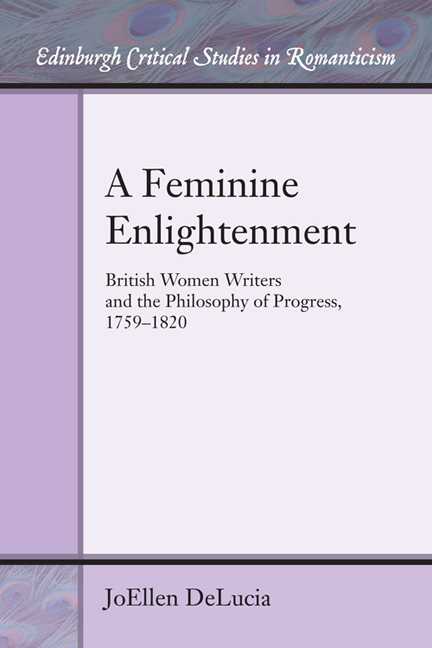Book contents
- Frontmatter
- Contents
- Acknowledgments
- Introduction: A Feminine Enlightenment?
- 1 The Progress of Feeling: The Ossian Poems and Adam Smith's Theory of Moral Sentiments
- 2 Ossianic History and Bluestocking Feminism
- 3 Queering Progress: Anna Seward and Llangollen Vale
- 4 Poetry, Paratext, and History in Radcliffe's Gothic
- 5 Stadial Fiction or the Progress of Taste
- Epilogue: Women Writers in the Age of Ossian
- Bibliography
- Index
Introduction: A Feminine Enlightenment?
Published online by Cambridge University Press: 05 August 2016
- Frontmatter
- Contents
- Acknowledgments
- Introduction: A Feminine Enlightenment?
- 1 The Progress of Feeling: The Ossian Poems and Adam Smith's Theory of Moral Sentiments
- 2 Ossianic History and Bluestocking Feminism
- 3 Queering Progress: Anna Seward and Llangollen Vale
- 4 Poetry, Paratext, and History in Radcliffe's Gothic
- 5 Stadial Fiction or the Progress of Taste
- Epilogue: Women Writers in the Age of Ossian
- Bibliography
- Index
Summary
The Bluestocking writer Elizabeth Montagu and the Scottish philosopher, historian, and jurist Lord Kames met in Edinburgh in 1766. After their initial meeting, Montagu and Kames began a correspondence that would last until Kames's death in 1781. Ranging in tone from flirtatious to deeply philosophical, their letters document a significant instance of a woman writer's contribution to the development of Enlightenment thought. In her first letter to Kames, Montagu writes,
I do not know when, nor indeed where; whether we met on the Orb of this Earth, had a short coquetry in the Planet Venus, or a sober Platonic love in Saturn, but I am sure we did not first meet at Edinburgh in the year 1766 … the first evening we supped together at our friend Dr. Gregory's; we took up our story, where it had perhaps indeed [begun] some thousand years before the creation of this Globe, if we gave it a prefatory complement, it was only the customary form to the edition of a work before published.
In likening their first meeting to the resumption of an ongoing story or an already published book, Montagu presages their intellectual collaboration, which took the form of letters that included shared revisions to the fourth edition of Kames's Elements of Criticism (1769) and the co-writing of portions of his yet to be published Sketches of the History of Man (1774), which both Montagu and Kames considered his greatest work. Their subsequent letters debated the nature of progress and women's contributions to aesthetic and social development, making their correspondence an ideal “prefatory complement” to my own book and its exploration of women writers’ contributions to and critiques of Enlightenment narratives of progress.
In a later letter celebrating the publication of Adam Ferguson's Essay on Civil Society in 1767, Montagu describes progress as a gendered and uneven movement.
- Type
- Chapter
- Information
- A Feminine EnlightenmentBritish Women Writers and the Philosophy of Progress, 1759-1820, pp. 1 - 18Publisher: Edinburgh University PressPrint publication year: 2015



